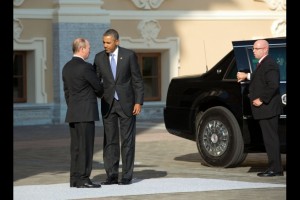New York Times on Syria and Ukraine: How Propaganda Works

In the multilayered double standards of its international coverage, the New York Times demonstrates how propaganda works: Outrage is the only appropriate response when an adversary breaks a rule but a shrug is okay when it’s “our side.” Plus, there must be perfect evidence to accuse “our side” of an offense but anything goes when it’s an adversary.
Recent Times’ articles illustrate how this hypocrisy works. Take, for example, international law, especially prohibitions against aggression. When the topic is Ukraine and the alleged violator is Russia, no extreme is too extreme in denouncing Russia’s President Vladimir Putin. But the concern about international law simply disappears when discussing Syria and the desirability of U.S. President Barack Obama overthrowing the government there.
In Ukraine, despite the murky circumstances surrounding last February’s coup d’etat ousting the elected president and unleashing war in the ethnic Russian east, the Times refuses to see any merit in the Russian side of the argument. It’s all about the sacred principle of non-intervention; the mitigating circumstances don’t matter.
However, when it comes to demanding Obama dispatch the U.S. military to take out Syria’s government, the Times forgets international law; it’s all about the mitigating circumstances that justify the U.S. bombing of Syrian government troops and paving the way for a rebel victory.
Image: Amid the crisis over Syria, President Vladimir Putin of Russia welcomed President Barack Obama to the G20 Summit at Konstantinovsky Palace in Saint Petersburg, Russia, Sept. 5, 2013. (Official White House Photo by Pete Souza)
A good example of this is a Nov. 28 article by Times correspondent Anne Barnard that hammers Obama over the supposed inconsistencies in his policy of bombing Islamic State radicals inside Syria but not also turning the U.S. military loose against the Syrian government of President Bashar al-Assad.
Barnard writes that anti-Assad forces inside Syria “conclude, increasingly, that the Obama administration is siding with Mr. Assad, that by training United States firepower solely on the Islamic State it is aiding a president whose ouster is still, at least officially, an American goal.
“Their dismay reflects a broader sense on all sides that President Obama’s policies on Syria and the Islamic State remain contradictory, and the longer the fight goes on without the policies being resolved, the more damage is being done to America’s standing in the region.”
It may be a fair point that the U.S. military strikes inside Syria against Islamic State radicals, who have also seized territory in Iraq, is at least a technical violation of international law, but the Syrian government has acquiesced to these attacks since they are aimed at a rebel force that is widely regarded as terrorist. Thus, the bombings have some color of legitimacy.
However, attacking Syrian government forces is a horse of an entirely different color. That would be a clear-cut violation of international law. It would be a war of aggression deemed by the Nuremberg Tribunal after World War II to be the “supreme international crime” because it “contains within itself the accumulated evil of the whole.” Yet, this important legal point is entirely missing from the Times article, which focuses instead on how Obama has offended Assad’s opponents by attacking the Islamic State, not Assad.
In effect, the Times is pushing the neoconservative line that the United States should first undertake “regime change” in Syria before it deals with the Islamic State. In making that case, the Times not only leaves out the question of international law but gives short-shrift to the danger that destroying Assad’s military might open the gates of Damascus to the Islamic State or al-Qaeda’s affiliate Nusra Front, the only two effective fighting forces among the Syrian rebels.
Addressing International Law
A more professional news article would have seriously addressed both the international law issue and the dangers inherent in a U.S.-driven Syrian “regime change,” including the very real possibility that a jihadist victory in the heart of the Middle East could force a full-scale U.S. military intervention, requiring hundreds of thousands of troops and costing hundreds of billions of dollars.
Indeed, the Times’ coverage of the Syrian crisis often looks like a replay of the newspaper’s gullible acceptance of the neocon-predicted “cakewalk” through Iraq in 2003. In the Iraq War, too, there was scant attention paid to the question of the United States violating international law and to the chance that the invasion might not go as smoothly as the neocons dreamt.
While ignoring the issue of U.S. aggression in a war on Syria, the Times presents the Ukraine crisis as a simple matter of Russian “aggression” by leaving out the context of a U.S.-backed coup on Feb. 22 that forced President Viktor Yanukovych and his officials to flee for their lives and prompting resistance to the new order from eastern and southern Ukraine which had been Yanukovych’s political base.
As former Rep. Dennis Kucinich has written, this important background – and the earlier expansion of NATO into eastern Europe – would put the Ukraine story in a very different light:
“NATO encirclement, the U.S.-backed coup in Ukraine, an attempt to use an agreement with the European Union to bring NATO into Ukraine at the Russian border, a U.S. nuclear first-strike policy, are all policies which attempt to substitute force for diplomacy.
“Russia’s response to the terror unleashed by western-backed neo-nazis in Crimea and Odessa came after the local population appealed to Russia to protect them from the violence. Russia then agreed to Crimea joining the Russian Federation, a reaffirmation of an historic relationship.
“The Western press begins its narrative on the Crimea situation with the annexation, but completely ignores the provocations by the West and other causal factors which resulted in the annexation. This distortion of reality is artificially creating an hysteria about Russian aggressiveness, another distortion which could pose an exceptionally dangerous situation for the world, if acted upon by other nations. The U.S. Congress is responding to the distortions, not to the reality.”
Propaganda Vehicle
Another way that the New York Times makes itself useful as a neocon propaganda vehicle is by applying two radically different standards for proof when an accusation is made. If, for instance, anyone notes that U.S.-funded “non-governmental organizations” played a behind-the-scenes role in instigating the Ukrainian coup – even though there is clear documentary evidence from the public reports of the National Endowment for Democracy and similar U.S.-funded entities – that is deemed a “conspiracy theory.”
However, if you want to accuse the Russians of secretly financing anti-fracking groups in Romania, you don’t need any evidence at all, just vague assertions. So, on Dec. 1, the Times published a lengthy article by Andrew Higgins promoting the Romanian government’s suspicions that local environmental groups which have blocked Chevron’s use of hydraulic fracturing for shale gas are fronts for Russia’s energy industry.
The article acknowledges that “this belief that Russia is fueling the protests, shared by officials in Lithuania, where Chevron also ran into a wave of unusually fervent protests and then decided to pull out, has not yet been backed up by any clear proof. And [Russia’s] Gazprom has denied accusations that it has bankrolled anti-fracking protests.
“But circumstantial evidence, plus large dollops of Cold War-style suspicion, have added to mounting alarm over covert Russian meddling to block threats to its energy stranglehold on Europe.”
It’s not exactly clear what the Times’ “circumstantial evidence” is either, but the article next turns to more unsubstantiated accusations aired in September by then-NATO Secretary General Anders Fogh Rasmussen, who “pointed a finger at Russia” by citing its alleged support for NGOs, another hypocritical twist because many NGOs are actually funded by the U.S. government and are deployed to disrupt or destabilize adversaries around the world.
Ignoring this hypocrisy, Rasmussen declared: “Russia, as part of their sophisticated information and disinformation operations, engaged actively with so-called nongovernmental organizations — environmental organizations working against shale gas — to maintain dependence on imported Russian gas.”
Again, the Times notes that Rasmussen presented no proof, saying that his judgment was based on what NATO allies had reported. Yet, despite this admitted lack of evidence, the Times still devotes portions of two pages to this Russian-hand-hidden-behind-the-anti-fracking-cause hypothesis. If such flimsy speculation were aimed at the United States, it would be laughed off as a paranoid conspiracy theory or labeled “disinformation.”
Also not noted in the Times article is Rasmussen’s record for getting facts wrong. As Danish prime minister in 2003, he supported the U.S. invasion of Iraq and famously declared that
“Iraq has WMDs. It is not something we think; it is something we know. Iraq has itself admitted that it has had mustard gas, nerve gas, anthrax, but Saddam won’t disclose. He won’t tell us where and how these weapons have been destroyed. We know this from the UN inspectors, so there is no doubt in my mind.”
Of course, pretty much everything that Rasmussen declared about Iraq’s WMD was wrong, but it succeeded in tricking the Danish parliament into voting to join Bush’s “coalition of the willing” to invade Iraq. Rasmussen was later rewarded for his role in this aggressive war against Iraq by getting a plum job as NATO secretary general where he similarly has hyped alarms about Russia.
Yet, the New York Times ignores this history as this “newspaper of record” applies its endless double standards to ratchet up tensions in Syria and Ukraine.
Investigative reporter Robert Parry broke many of the Iran-Contra stories for The Associated Press and Newsweek in the 1980s. You can buy his latest book, America’s Stolen Narrative, either in print here or as an e-book (from Amazon and barnesandnoble.com). For a limited time, you also can order Robert Parry’s trilogy on the Bush Family and its connections to various right-wing operatives for only $34. The trilogy includes America’s Stolen Narrative. For details on this offer, click here.


